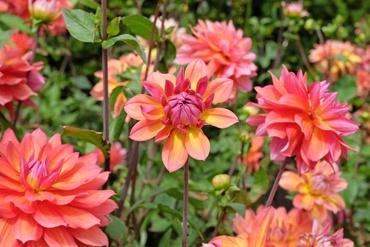Why you should sow onions on Boxing Day
Winter and early spring are often a good time to do a bit of pruning. When the trees are bare, it’s easier to see their shape and work out which branches to remove. However, it’s not the right time for pruning all plants, so it’s always a good idea to check the specific requirements of your plants before you start. Here are a few guidelines on pruning shrubs and trees in winter.
Basic pruning tips
Remembering these few basic rules will keep you safe while you work and give you better results:
- Make sure your tools are sharp – a clean cut will cause less damage to branches and heal faster, so there’s less chance of your plants becoming infected by diseases.
- Work slowly and stand back frequently to look at what you’ve done and assess what still needs removing.
- Take care when working at height. It’s a good idea to have someone else with you when you’re working on a ladder. And don’t take risks – if the job is too big, call in a professional tree surgeon.
Pruning deciduous and evergreen shrubs
Deciduous shrubs drop their leaves in autumn, storing food reserves in their roots over winter, ready for spring. This means that winter pruning tends to result in vigorous spring growth. However, some deciduous shrubs flower on the previous year’s growth, so pruning these in winter would mean no flowers in the following year. As a general rule of thumb, deciduous shrubs that flower in spring (e.g. forsythia and Japanese quince) should be pruned straight after flowering. Shrubs that flower in late summer and autumn (e.g.hydrangea, buddleja and fuchsia) can usually be pruned in late winter or early spring. There are exceptions to every rule, though, so check the specific requirements of your plants before you get out your secateurs.
Evergreen shrubs are best pruned soon after they have finished flowering. Hard pruning of evergreens can usually be done in late winter or early spring, but as always, look the plant up first to check on pruning requirements.
Five trees and shrubs to prune in winter or early spring
- Shrub roses – remove damaged and crossing branches and cut the main branches down by a third, just above an outward-facing bud.
- Japanese maples (Acer palmatum) don’t need routine pruning, but if you need to remove a branch, do it in winter to avoid excessive ‘bleeding’ of sap.
- Buddleja – cut back in early spring to solid buds about 30cm above ground level.
- Dogwoods (Cornus sanguinea and sericea) – cut back in early spring to 5-7.5cm (2-3in) above ground level to encourage brightly coloured new shoots for next winter.
- Apple trees – prune in winter, aiming to create a wineglass-shaped framework of branches.
We have a wide range of pruning tools and other garden equipment in our centre, so visit us soon for all your gardening needs!





